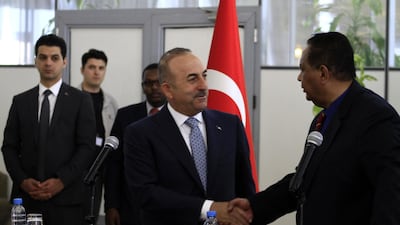Turkey’s foreign minister said on Tuesday that his country was ready to assist Sudan in maintaining security in the Red Sea by rebuilding what was once an Ottoman port and construct a naval dock on the Sudanese coast. The move is set to maintain civilian and military ships passing through the area, as Ankara seeks to broaden its ties in Africa.
The agreement could be expanded to include other forms of military cooperation, such as joint exercises, said Ibrahim Ghandour, the Sudanese foreign minister, in a joint press conference with his Turkish counterpart Mevlut Cavusoglu.
“Turkey will continue its security support for Sudan and counter-terrorism in the Red Sea region,” Cavusoglu said.
The move will likely raise concerns among the regional rivals of Turkey, which already has a military base in nearby Somalia. It came at the end of a two-day state visit by President Recep Tayyip Erdogan, the first to Sudan by a Turkish head of state, and the conclusion of a raft of trade, security and technology deals that include the temporary handing over of a Red Sea port town and former Ottoman military fort that Turkey hopes to rebuild.
Turkey has sought closer relations with Africa over the past decade, more than tripling its diplomatic missions on the continent from 12 in 2009 to 39 now, and bilateral trade also tripled between 2003 and 2015 to $17.5 billion according to the Foreign Ministry. It also played a key role in providing humanitarian aid to Somalia during the 2011 famine.
Ankara’s largest overseas military base was inaugurated in Mogadishu in September, where Turkish officers are stationed to train thousands of Somali soldiers.
“Turkey’s outreach to Africa is a foreign policy initiative that commenced almost a decade ago when Turkey decided to run for a seat at the UN Security Council,” said Sinan Ulgen, a former Turkish diplomat and visiting scholar at Carnegie, adding that the effort raised Turkey’s humanitarian profile and soft power in the continent. “Over time, the initiative became a more permanent feature of Turkish policy with economic, humanitarian and regional security aspirations.”
“In Sudan, Turkey’s primary aim is to deepen economic collaboration and provide industrial know-how that is likely to be facilitated with the recent easing of US sanctions. But Ankara is not looking in Sudan to replicate its military investment in Somalia,” he added.
_______________
Read more:
Turkey and Israel’s deep trade ties expose the emptiness of Erdogan’s rhetoric over Jerusalem
Erdogan says Turkey aims to open embassy in East Jerusalem
Turkish Cypriots 'joint owners' of Cyprus, not minority: Erdogan
_______________
Relations with Africa have earned greater urgency as Turkey’s relationship with key regional powers has floundered in recent years amid the conflicts in Iraq and Syria. Turkey backed the rebels in the latter, and links with the governments in Baghdad and Erbil have ebbed and flowed with the unfolding crises.
Erdogan’s backing of the Muslim Brotherhood after the 2013 ouster of president Mohammad Morsi also soured relations with President Abdel Fattah al-Sisi and his allies in Saudi Arabia and the UAE, as well as Turkey’s public backing of Qatar in its dispute with other Gulf countries.
Erdogan said Khartoum had agreed to allow Turkey to redevelop Suakin, a Red Sea port that was once used by the Ottoman military in maintaining the security of the Hijaz region and was a stop for pilgrims traveling to Mecca. A Turkish official said the area was significant culturally for its Ottoman heritage.
In a speech tinged with condemnation of western interference in the region, Erdogan said Turkey’s plans to rebuild the Suakin would boost religious tourism to Sudan and would defy the powers that destroyed the Ottoman empire.
The expansion of Turkey’s political, military and economic ties in Africa, particularly in countries with large Muslim populations, will help cement the country’s self-proclaimed role as a champion of Muslim causes. Earlier this month Ankara stepped up its rhetoric against the United States over Donald Trump's decision to move its embassy to Jerusalem and declare it the capital of Israel, a move that energised the president’s base at home and forced the opposition to unite behind him.
Turkey hosted an extraordinary summit of the Organisation of Islamic Cooperation which declared East Jerusalem the capital of Palestine, and has been an outspoken critic of Myanmar’s treatment of the Rohingya Muslims.
“Turkey’s efforts to become a Middle East power has been largely exhausted because of how it played its hand in Syria,” said Soner Cagaptay, author of The New Sultan, a biography of Erdogan. “There’s a theme going on here, together with the Rohingya issue, Jerusalem, Sudan, to cast him in the eyes of the electorate as the defender of Sunni Muslims, and it’s a brand he’s cultivating.”
“These issues mobilize his lethargic base,” he added. “He wants to make Turkey great again, and to make Muslims proud.”


